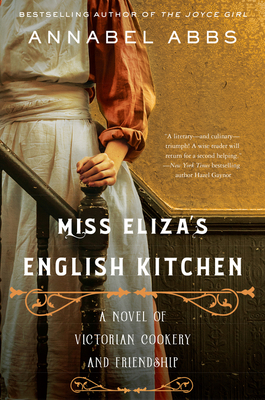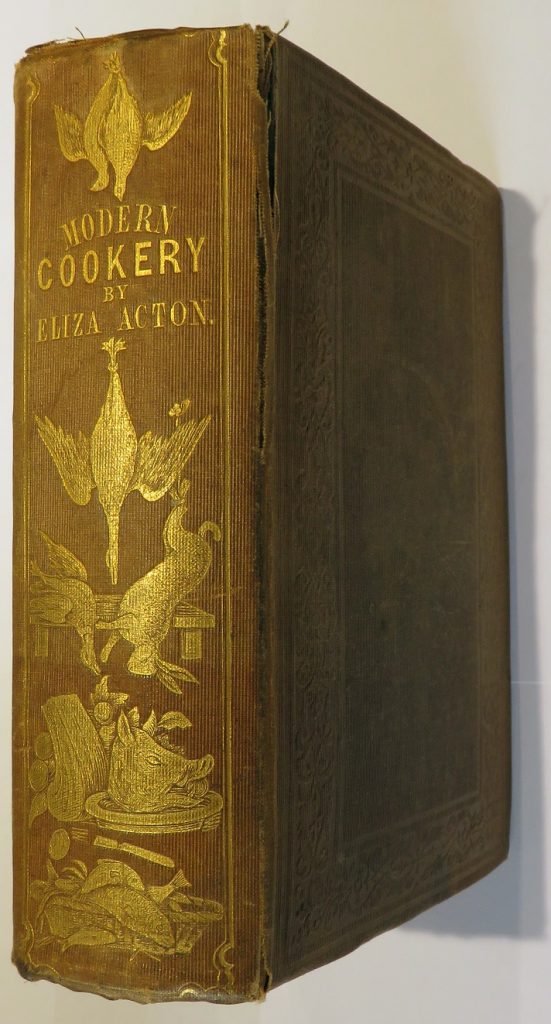 Miss Eliza's English Kitchen: A Novel of Victorian Cookery and Friendship by Annabel Abbs
Miss Eliza's English Kitchen: A Novel of Victorian Cookery and Friendship by Annabel Abbs Format: eARC
Source: supplied by publisher via Edelweiss
Formats available: paperback, ebook, audiobook
Genres: historical fiction
Pages: 400
Published by William Morrow Paperbacks on October 26, 2021
Purchasing Info: Author's Website, Publisher's Website, Amazon, Barnes & Noble, Kobo, Bookshop.org, Better World Books
Goodreads
In a novel perfect for fans of Hazel Gaynor’s A Memory of Violets and upstairs-downstairs stories, Annabel Abbs, the award-winning author of The Joyce Girl, returns with the brilliant real-life story of Eliza Acton and her assistant as they revolutionized British cooking and cookbooks around the world.
Before Mrs. Beeton and well before Julia Child, there was Eliza Acton, who changed the course of cookery writing forever.
England 1837. Victorian London is awash with exciting new ingredients from spices to exotic fruits, but Eliza Acton has no desire to spend her days in the kitchen. Determined to be a poet and shamed by the suggestion she write a cookery book instead, she at first refuses to even consider the task. But then her father is forced to flee the country for bankruptcy, shaming the family while leaving them in genteel poverty. As a woman, Eliza has few options, so she methodically collects recipes while teaching herself the mysteries of the kitchen. And to her surprise, she discovers she is not only talented at cooking—she loves it.
To assist her, she hires seventeen-year-old Ann Kirby, the impoverished daughter of a war-injured father and a mother losing her grip on reality. Under Eliza’s tutelage, Ann learns about poetry, cookery, and love, while unravelling a mystery in her mistress’s past. Through the art of food, Eliza and Ann develop an unusual friendship and break the mold of traditional cookbooks by adding elegant descriptions and ingredient lists, that are still used today.
Told in alternate voices, this is an amazing novel of female friendship, the ensuring struggle for freedom, the quiet joy of cookery, and the place of food in creativity all while bringing Eliza Acton out of the archives and back into the public eye.
My Review:
This was not the book I intended to read for today – and I’m kind of sorry that I changed my mind about that.
Yesterday’s book was excellent – compelling and riveting albeit a bit stomach-churning (OMG I just realized the irony of that – all things now considered!) but I just wasn’t up for another adrenaline-producing title in the book hangover. (Hair of the dog may work for drink hangovers but for book hangovers not so much.)
There are absolute bushel-baskets full of good reviews for Miss Eliza’s English Kitchen, including among my reading circle. Because publication was delayed last year it’s been on my TBR pile for a while but I never got a round tuit. This seemed like a good opportunity to rectify that situation.
I expected to enjoy this. I love English history, I very much like stories about women’s friendships that don’t have to end in marriage, and the idea that this was a fictionalized life of a real woman who really did achieve rather a lot was appealing.
Instead, it was a book that seemed tailor-made to screech like chalk on the blackboard that contained pretty much all of my buttons.
Let me explain…
First, Eliza Acton was a real person who really did write what became a landmark cookbook. If you’ve ever looked at a recipe – EVER – you’ve seen the results of her work as she was the first cookbook author to include a comprehensive list of the ingredients – including precise measurements! – for her recipes as well as an approximation of the time it would take to make the recipe including preparation time.
 If you’ve ever attempted to recreate an old family recipe, where the measurements go something like “a pinch of this”, “a handful of that”, “a bit of this other thing”, etc., etc. – before Acton’s Modern Cookery in All Its Branches, (later editions published as Modern Cookery for Private Families), all recipes were written just like that, only in narrative form without the list of ingredients. One had to parse out what one needed to make the dish by reading through the recipe over and over until one was certain one had everything.
If you’ve ever attempted to recreate an old family recipe, where the measurements go something like “a pinch of this”, “a handful of that”, “a bit of this other thing”, etc., etc. – before Acton’s Modern Cookery in All Its Branches, (later editions published as Modern Cookery for Private Families), all recipes were written just like that, only in narrative form without the list of ingredients. One had to parse out what one needed to make the dish by reading through the recipe over and over until one was certain one had everything.
But important doesn’t necessarily mean interesting. Or maybe it’s just that this fictionalization of her life didn’t pick up the interesting bits.
It was an interesting idea to tell Acton’s story in alternating perspectives. Acton’s own rather obsessive and self-centered viewpoint alternates with that of her unknown and unsung assistant, Ann Kirby. (I do not believe Kirby existed as a singular character. She may be an amalgam of several unnamed assistants – because there must have been some – or she may be entirely imaginary, a cipher on whom can be pinned a whole lot of noblesse oblige and quite a few social issues that Acton may or may not have engaged with in her own life.)
Acton was rather firmly middle class, having been raised as a gentlewoman before her father went bankrupt. Kirby grew up in poverty, in a life of few or no choices, often not certain where her next meal was coming from, with her dad a wounded war veteran drowning in alcohol as her mother descends into dementia in a world where there’s no help for either.
It’s not that Acton and Kirby could not have developed a friendship, but in the book we have they are generally talking past each other. Acton can’t envision that Kirby has not had any of the advantages she has had, while Kirby sees Acton as being rich as Croesus if only because of the amount of food she is able to waste in her cooking experiments.
The book hints at a romance between the two but never resolves the issue in either direction. It just dangles like the “sausage and chestnuts” that one of the Acton’s boarding house’s more disgusting male guests regularly displays under the dining table to whichever serving girl can be bullied into picking things up from under said table.
Because one of the themes of this story is just how little agency women have in their own lives. Acton is under her mother’s overbearing, over-critical, over-complaining thumb because she never married, while Kirby is under every thumb she encounters because she’s poor. Acton’s obsession with her own ambitions leaves her blind to their commonality.
But OMG her mother is the kind of character who makes Lizzie Bennett’s ambitious mother look like a saint in comparison. (In case you’re wondering – no, I didn’t like her either.)
I’m flailing a bit. I wanted so very much to like this book. It just fell flat for me in every instance where it didn’t make me want to throw it across the room. (I read on an iPad. I resist the temptation to wallbang a book at all costs – because costs. And I was still sorely tempted.)
Acton isn’t nearly as compelling as her cookbook. We don’t even get enough details of all the food she’s experimenting with to salivate over it. One should come out of reading a book like this hungry – and I wasn’t at all. Acton is much too self-absorbed to be friends with anyone, let alone her assistant. Her mother is a horror and so is their relationship. Both women get, honestly, shat upon at every turn.
The language is stilted, the relationships that do seem to exist don’t come to any point unless it’s a terrible one. Too many things – like the possible flirtation between Acton and Kirby or the sudden introduction of Acton’s rumored but not proven daughter all seem to hang over the mantlepiece like an entire arsenal of Chekhov’s Guns.
There are a LOT of people who really seem to have enjoyed this book. I so wasn’t one of them that I can’t even.
Escape Rating D: I have to say that I didn’t escape at all. This story had so much possibility in it and for this reader at least it was entirely wasted. Obviously it wasn’t for me. But it clearly was for lots of readers. Look at the reviews and decide for yourself.
